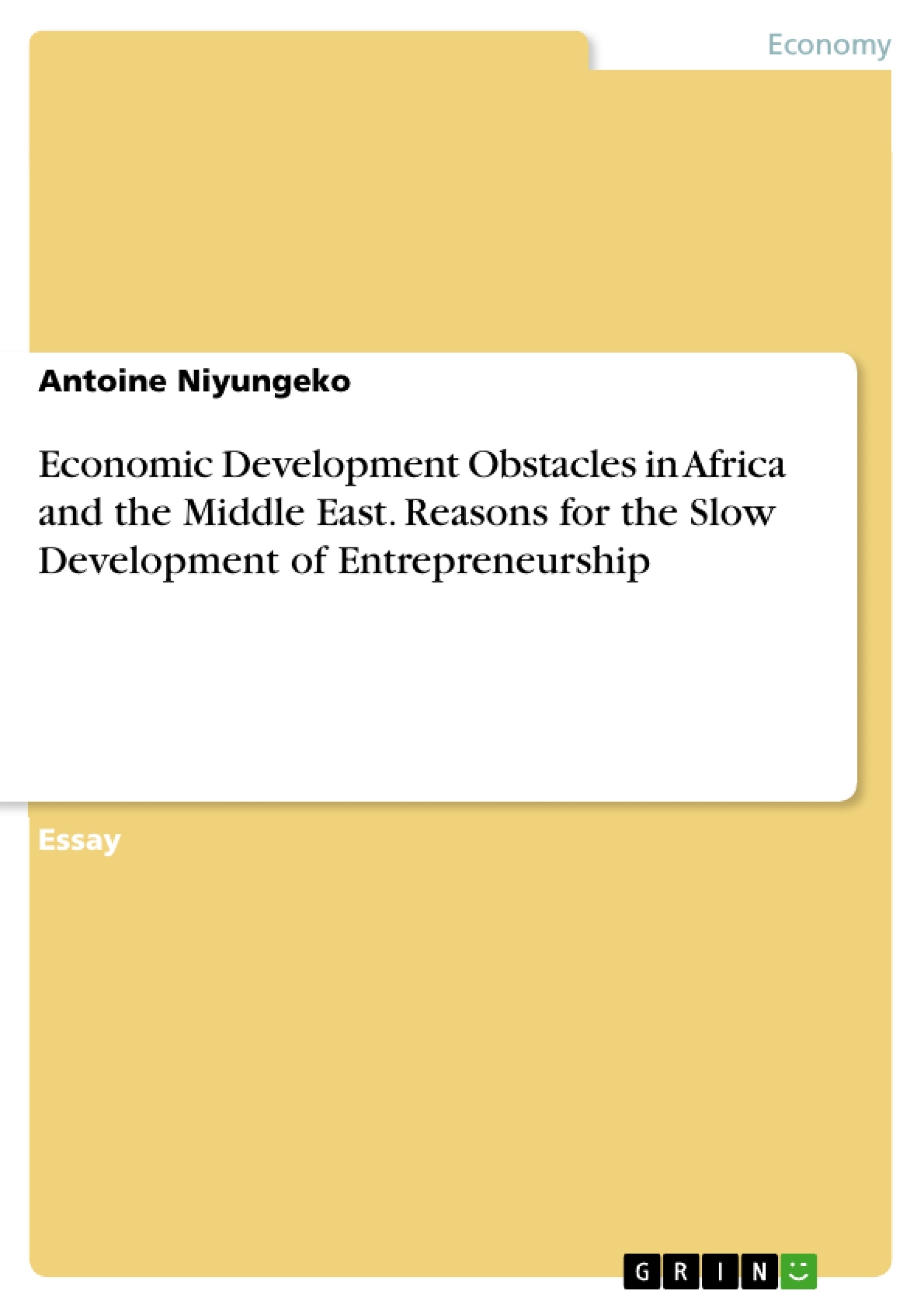This paper analyses what may be the reasons for Africa and the Middle East seemingly lagging behind other world regions in terms of economic development. It explains why entrepreneurship has been slow to develop in the region, and gives suggestions for how it may be developed more assertively. The problems that may constitute the reasons for lagging behind others may be inadequate education systems, division and war or heavy administrative procedures. Furthermore, difficult access and high-lending interest rates as well as colonialism consequences can be a reason. Income or poverty in the regions may reduce the demand for goods and services, support high corruption, lead to low salaries and wages for states employees and insufficient savings for workers to begin new business.
Education in Africa is a heritage of the colonial system which did not intend to develop entrepreneurship in colonized countries. Courses are dominated by modules that are not related to entrepreneurship, but full of content like foreign literature like French and English or History. Courses offered by universities are disconnected to labor market needs and new technologies. Courses are full of theory without practical knowledge. Professional courses are limited, and graduates lack in practical knowledge.
Secondly, African countries are not united. Some of them have much diversity in culture, religion and ethnics. But instead of using the diversity to generate new ideas, creativity and innovation, the diversity is the basis of war in African countries. No entrepreneur can engage seriously in a country at war. Molem indicated Cameroon had linguistic and cultural diversity with more than 289 ethnic groups, and a colonial legacy of French and English cultures and languages, plus remnants of a German substratum.
Inhaltsverzeichnis (Table of Contents)
- Introduction
- Inadequate Education System
- Division and War
- Heavy Administrative Procedures
- Difficult Access and High Lending Interest Rate
- Low Income or Poverty in the Regions
- High Corruption in the Regions
Zielsetzung und Themenschwerpunkte (Objectives and Key Themes)
This essay aims to analyze the reasons behind the seemingly slower economic development of Africa and the Middle East compared to other world regions. It investigates why entrepreneurship has been slow to take root in the region and suggests ways to promote its growth.
- Obstacles to Entrepreneurship in Africa and the Middle East
- The Impact of Education Systems on Economic Development
- The Role of Conflict and Instability
- Challenges Related to Finance and Access to Capital
- The Influence of Poverty and Corruption
Zusammenfassung der Kapitel (Chapter Summaries)
Introduction
This chapter introduces the essay's focus on analyzing the reasons behind the slower economic development of Africa and the Middle East. It outlines the key obstacles to entrepreneurship that will be explored in detail in subsequent chapters, including inadequate education systems, division and war, heavy administrative procedures, limited access to finance, poverty, and corruption.
Inadequate Education System
This chapter examines the shortcomings of the education system in Africa as a significant barrier to entrepreneurship. It highlights the lack of focus on practical skills, the disconnect between education and labor market needs, and the challenges posed by limited access to education and inadequate funding.
Division and War
This chapter addresses the detrimental effects of division and war on entrepreneurial activity. It discusses the prevalence of internal conflicts in Africa and the Middle East, the resulting instability, and the challenges faced by entrepreneurs in operating in such environments.
Heavy Administrative Procedures
This chapter delves into the issue of burdensome administrative procedures in the region, highlighting their impact on businesses and entrepreneurs. The chapter cites the World Bank's findings on Sub-Saharan Africa's challenges with obtaining electricity, engaging in cross-border commerce, and registering property.
Difficult Access and High Lending Interest Rate
This chapter explores the challenges of obtaining financing in Africa and the Middle East. It emphasizes the high lending interest rates compared to developed countries, highlighting the impact on entrepreneurial activities and the struggle to secure capital for growth.
Low Income or Poverty in the Regions
This chapter examines the connection between low income and poverty in the region and the challenges it poses for entrepreneurs. It discusses the lack of purchasing power among the population, the need for profitable business models, and the impact on saving for future business ventures.
High Corruption in the Regions
This chapter focuses on the damaging effects of corruption on economic development and entrepreneurial activities. It highlights the negative impact of corruption on attracting investors, increasing costs for entrepreneurs, and hindering economic growth.
Schlüsselwörter (Keywords)
The essay focuses on key issues related to economic development, entrepreneurship, education systems, conflict and instability, finance and access to capital, poverty, and corruption in Africa and the Middle East.
Frequently Asked Questions
Why is entrepreneurship slow to develop in Africa and the Middle East?
Key reasons include inadequate education systems, political instability due to war, heavy administrative hurdles, high interest rates, and the lasting consequences of colonialism.
How does the colonial education heritage affect modern business?
The system was not designed to foster entrepreneurship. It focuses heavily on theory, foreign literature, and history rather than practical skills and labor market needs.
What role does cultural and linguistic diversity play in these regions?
While diversity could drive innovation, it is often used as a basis for division and conflict, which creates an unstable environment where entrepreneurs cannot operate seriously.
Why are interest rates a major obstacle for new businesses?
Lending interest rates in these regions are significantly higher than in developed countries, making it difficult for entrepreneurs to secure the capital needed for growth.
How does poverty impact the demand for goods and services?
Low income levels reduce the overall purchasing power of the population. This makes it hard for businesses to be profitable and prevents workers from saving enough to start their own ventures.
- Quote paper
- Antoine Niyungeko (Author), 2020, Economic Development Obstacles in Africa and the Middle East. Reasons for the Slow Development of Entrepreneurship, Munich, GRIN Verlag, https://www.grin.com/document/956949



